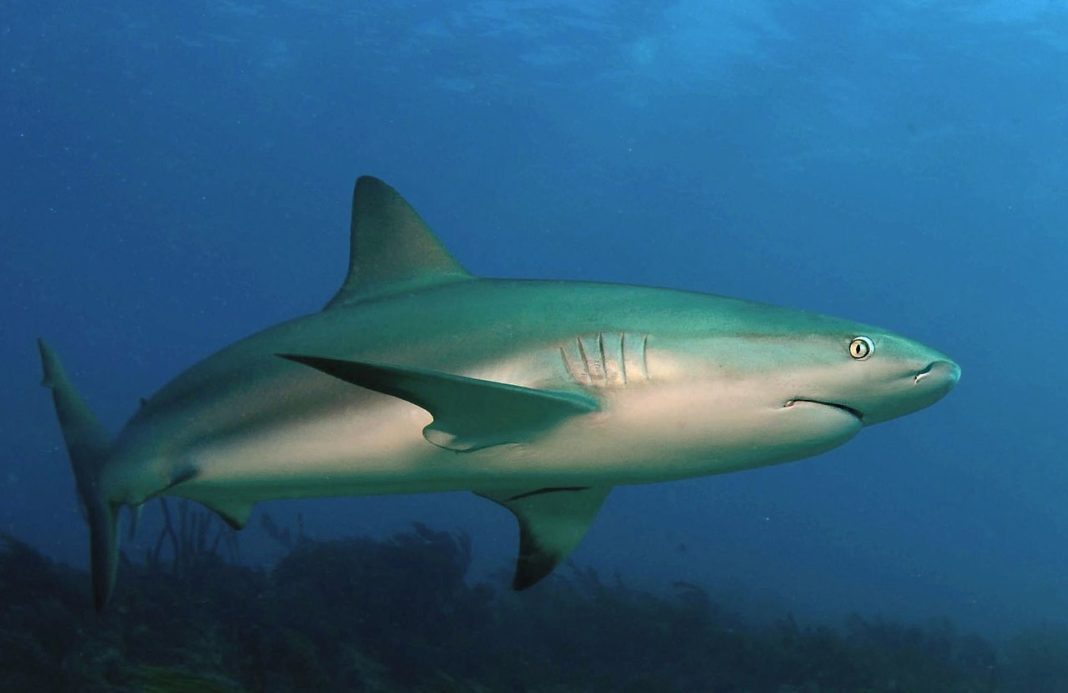The Florida Keys recorded its fourth shark bite in six months when a diver was bitten while spearfishing on Sept. 6.
Marathon scuba instructor Zack Winegardner was diving recreationally with friends in about 70 feet of water when he headed back to the boat’s anchor line with a speared black grouper. Though the group had seen a shark swim through the area earlier in the dive, it had disappeared since their initial encounter.
“Something came from behind and got me,” Winegardner told Keys Weekly, adding that no one from his dive crew saw the bite coming and that the entire ordeal was over in seconds. “I had no idea. I barely knew when it hit me. I looked back and it was still holding my arm, and then it just let go and bolted.”
Winegardner’s friends rushed him to Marathon’s Captain Hook’s marina, where he was eventually transported to the Marathon airport and flown via Trauma Star to Jackson South Medical Center in Miami. There he underwent surgery to close the wounds and repair tendons in his forearm.
Though initial reports unofficially attributed the bite to a reef shark, Winegardner had a different opinion.
“I haven’t argued the call,” he said. “The shark that passed us was a reef shark, but when I made eye contact with the shark that bit me, I’m positive it was a bull. But at that point it’s he said, she said, I guess.”
Many shark experts agree that bites on humans are cases of mistaken identity. The scenario is likely exacerbated by cloudy water with reduced visibility – conditions frequently found along the reef line in the Keys in the late summer months. But Winegardner estimated the visibility on the seafloor where the bite occurred to be roughly 30 feet, and he was surprised the shark didn’t target the large grouper he was carrying on the other side of his body.
“Especially at the bottom, it really wasn’t that bad,” he said. “This thing got me nowhere near my fish. If it was the same side or whatever, I’d say yeah, he missed the fish and got me. He straight up missed my fish by five feet.”
Though he was discharged from the hospital on Sept. 13, Winegardner still faces extensive physical therapy and at least one additional surgery in the coming weeks. His bite wounds extend from his wrist to mid-bicep, and he will need a skin graft to cover the most damaged section of his arm. As he does not currently have health insurance, a GoFundMe was established in his name by his grandmother to help defray some of the costs.
Three other shark bites have been reported in the Keys within the last half year. On Aug. 13, 10-year-old Jameson Reeder Jr. lost part of his leg after being bitten at Looe Key reef while snorkeling with his family. An April 17 bite at the Islamorada sandbar near Whale Harbor left one man with deep lacerations in his leg, while a June 29 bite on Summerland Key sent 35-year-old Lindsay Bruns of Flower Mound, Texas to the hospital for more than a week as she underwent multiple surgeries to repair most of the function in her injured leg.
According to the Florida Museum of Natural History’s International Shark Attack File (ISAF), there were a total of 112 combined provoked and unprovoked shark bites in 2021. 39 were provoked bites, a category that includes bites on spearfishers, among several other scenarios. The United States led the world in the number of unprovoked bites that year with 47 confirmed incidents, and Florida topped the list of states reporting bites with 28; Hawaii was a distant second with six.























